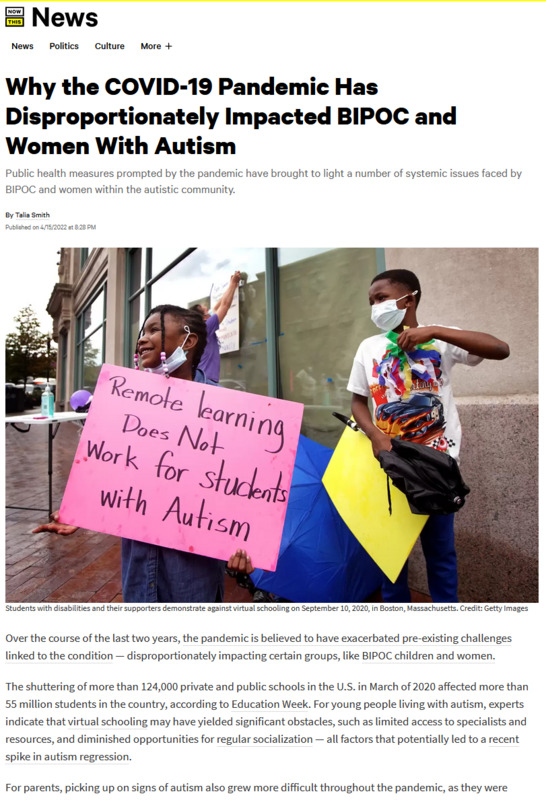Elemento
Why the COVID-19 Pandemic Has Disproportionately Impacted BIPOC and Women With Autism
Título (Dublin Core)
Why the COVID-19 Pandemic Has Disproportionately Impacted BIPOC and Women With Autism
Description (Dublin Core)
This is a news story from Now This News by Talia Smith. The author says that over the course of the pandemic, BIPOC and autistic women have been disproportionately affected. BIPOC parents who were not able to work remotely struggled to support their autistic children.
One study led by the NIH analyzing the impact of the pandemic on BIPOC and low-income populations shows that families with a child living with autism witnessed an increase in sleep issues and behavioral problems, in addition to increased conflict between children and adults and the use of more severe disciplinary methods.
In a study published in “Molecular Autism,” researchers revealed that for adults with autism, the pandemic brought relief from certain stressors like “sensory overload” and ultimately led to an “increase in solidarity.”
One study led by the NIH analyzing the impact of the pandemic on BIPOC and low-income populations shows that families with a child living with autism witnessed an increase in sleep issues and behavioral problems, in addition to increased conflict between children and adults and the use of more severe disciplinary methods.
In a study published in “Molecular Autism,” researchers revealed that for adults with autism, the pandemic brought relief from certain stressors like “sensory overload” and ultimately led to an “increase in solidarity.”
Date (Dublin Core)
April 15, 2022
Creator (Dublin Core)
Talia Smith
Event Identifier (Dublin Core)
HST580
Partner (Dublin Core)
Arizona State University
Tipo (Dublin Core)
Text story
Link (Bibliographic Ontology)
Controlled Vocabulary (Dublin Core)
English
Education--K12
English
Online Learning
English
Social Issues
Curator's Tags (Omeka Classic)
autism
ADHD
LGBTQ+
autistic
neurodivergent
diagnosis
Contributor's Tags (a true folksonomy) (Friend of a Friend)
study
science
BIPOC
Black
autism
women
family
children
mental health
Collection (Dublin Core)
Disability
LGBTQ+
Mental Health
Linked Data (Dublin Core)
Date Submitted (Dublin Core)
04/21/2022
Date Modified (Dublin Core)
04/22/2022
08/02/2022
Date Created (Dublin Core)
04/15/2022
Colecciones
This item was submitted on April 21, 2022 by [anonymous user] using the form “Share Your Story” on the site “A Journal of the Plague Year”: https://covid-19archive.org/s/archive
Click here to view the collected data.

